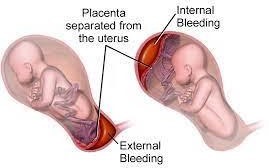A nurse is caring for a couple who experienced a fetal death at 37 weeks of gestation. Which of the following responses by the nurse is therapeutic?
"I think you should call your minister. He can help comfort you."
"It must be very difficult for you both. I will be available if you need anything."
"You are both young and can have other children."
"Did you have any complications during your pregnancy?"
The Correct Answer is B
Choice A rationale: This response assumes that the couple's religious beliefs are relevant to them, which may not be the case. It is not appropriate for the nurse to suggest involving their minister without knowing their preferences or beliefs.
Choice B rationale: This response acknowledges the couple's emotional experience and shows empathy toward their grief. It offers support and reassurance that the nurse will be available to help them through this difficult time.
Choice C rationale: While this statement may be factually true, it is not empathetic or supportive of the couple's current emotional state. It may come across as dismissive of their feelings and minimize their grief.
Choice D rationale: While gathering information about the pregnancy is essential for the medical record, this question does not address the couple's emotional needs. It is more appropriate to focus on offering emotional support and assistance rather than immediately delving into clinical details.
Nursing Test Bank
Naxlex Comprehensive Predictor Exams
Related Questions
Correct Answer is D
Explanation
Choice A rationale: While smoking during pregnancy can have adverse effects on both the mother and the baby, it is not the most common risk factor for placental abruption.
Choice B rationale: Maternal battering, or experiencing domestic violence, can have serious consequences for the pregnant woman and her unborn baby, but it is not the most common risk factor for placental abruption.
Choice C rationale: Maternal cocaine use during pregnancy can lead to various complications, but it is not the most common risk factor for placental abruption.
Choice D rationale: Maternal hypertension is the most common risk factor for placental abruption. Placental abruption is a serious condition where the placenta separates from the uterine wall before delivery, leading to potential complications for both the mother and the baby. Hypertension can cause changes in blood vessels that increase the risk of placental abruption.

Correct Answer is D
Explanation
Choice A rationale: Stopping breastfeeding is not an appropriate response to breast engorgement. Continuing to breastfeed frequently and effectively can help relieve the engorgement and ensure adequate milk supply.
Choice B rationale: While frequent breastfeeding is beneficial for both the baby and mother, this statement does not directly address breast engorgement.
Choice C rationale: Wearing a supportive bra during the daytime can actually help reduce breast engorgement and discomfort by providing gentle pressure and support to the breasts.
Choice D rationale: Breast engorgement is a common issue for breastfeeding mothers, especially during the early days after delivery. Applying cold compresses to the breasts before each feeding can help reduce swelling and discomfort associated with engorgement, making it easier for the baby to latch onto the breast.
Whether you are a student looking to ace your exams or a practicing nurse seeking to enhance your expertise , our nursing education contents will empower you with the confidence and competence to make a difference in the lives of patients and become a respected leader in the healthcare field.
Visit Naxlex, invest in your future and unlock endless possibilities with our unparalleled nursing education contents today
Report Wrong Answer on the Current Question
Do you disagree with the answer? If yes, what is your expected answer? Explain.
Kindly be descriptive with the issue you are facing.
